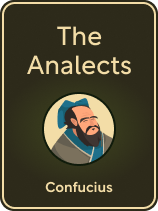

This article is an excerpt from the Shortform book guide to "The Analects" by Confucius. Shortform has the world's best summaries and analyses of books you should be reading.
Like this article? Sign up for a free trial here.
Why doesn’t Confucius think he came up with any new ideas? If you want to be a good person, where does Confucius think you should start?
Confucius looked back to the values and practices of the past to find wisdom for living today. He believed that certain traditions are worth keeping alive. This is reflected in The Analects, where he discussed the importance of respecting where we come from.
Read more to learn why we would do well to study the past and respect tradition as Confucius did.
Why We Should Study the Past
Confucius believed that the best way to learn about the world was to study the past, meaning both history and religion. In particular, he admired the early years of the Zhou dynasty (established in 1046 BC), and he strove to respect tradition and bring back the values and practices of that time.
Confucius says several times throughout The Analects that he wrote nothing and discovered nothing. His teachings all come from classic works of the early Zhou dynasty, and the books he’s credited with writing are compilations of traditional beliefs and practices. In other words, Confucius doesn’t think he deserves credit for discovering or coming up with any new ideas—only for repopularizing old ideas.
(Shortform note: Although Confucius says he doesn’t want credit for his teachings, he’s arguably been given it—Confucianism has endured for thousands of years. His philosophy was so influential that texts on Confucianism were required reading for the Chinese civil service exams for centuries.)
| Background: The Duke of Zhou and His Legacy Confucius particularly admired Duke Wen of Zhou, who ruled the early Zhou dynasty as regent after his brother (King Wen of Zhou) passed away. The Duke of Zhou’s rule was a time of peace and prosperity, which Confucius attributes to the Duke’s virtuous character and his concern for the common people. Confucius also believed that the problems China was facing during his lifetime were the result of people—and particularly rulers—abandoning those old morals and traditions. Therefore, Confucius reasoned, the best way to solve the country’s problems was to bring back the beliefs and practices of those early Zhou years. It was especially important to Confucius to instill such beliefs in China’s ruler; he believed that people would naturally follow a virtuous leader’s example by behaving virtuously themselves. |
Traditional Values: Respect and Family Obligation
In keeping with traditional Zhou values, Confucius places great value on respecting others, especially your parents. He says that respect for your parents is the foundation of being a good person: If you learn proper respect for your parents as a child, you’ll continue to respect and obey your superiors, meaning that you’ll become a good worker and won’t cause any trouble.
(Shortform note: Some psychologists might say that Confucius’s emphasis on obedience could do more harm than good. Some research shows that children who are too obedient—who are never taught when and how to say no—are at greater risk of abuse and exploitation throughout their lives: Obedient children tend to grow into passive adults, making them less likely to stand up for themselves and more likely to be taken advantage of by peers and employers. Therefore, these psychologists say, parents should aim to raise children who are polite and cooperative rather than blindly obedient. Parents can strike this balance by honoring their child’s right to say no—for instance, listening to their child’s concerns and being willing to compromise with them.)
If you believe that your parents are doing something wrong (either legally or morally), gently try to correct them, Confucius advises. However, don’t directly challenge them, and stay respectful even if they don’t listen to you. If they’re unwilling to change, don’t press the matter.
| When You Can’t Change Someone’s Mind When a loved one is doing something you believe is wrong, it can be hard to let go of your desire to change or challenge their behavior. Further, it can be easy to get frustrated with them and thus hard to stay respectful. In Difficult Conversations, the authors offer some reminders that might help you accept the situation. First, remember that what other people do isn’t your responsibility—you can offer advice, but you can’t force your loved ones to change their behavior. Second, remember that your loved ones are only human. People make mistakes and fall into bad habits. This means that they might not be able to change in the ways you think they should, or not immediately. Finally, understand that letting go of the situation doesn’t mean you don’t care about that person. It just means that you recognize this may be the wrong time for a difficult conversation or that you might not have the necessary skills to manage such a conversation. |
Traditional Practices
In addition to emphasizing traditional values, Confucius underscores the importance of traditional practices. The text Confucius references most often is the Book of Rites, which describes the traditional ceremonies, administrative practices, and social etiquette of the Zhou dynasty. Many of his lessons are about following the Rites; Confucius believed that the early Zhou dynasty had been a golden age for China, and he hoped to bring back the prosperity of those days through these traditional practices.
| Background: The Mandate of Heaven One of the key beliefs that influenced Confucius’s teachings—especially his devotion to tradition—is Tianming, or the Mandate of Heaven. This belief states that China’s rulers are divinely chosen and blessed with great power; in return, they must use that power for the good of all their people. A good ruler will be rewarded with peace and prosperity. However, if a ruler breaks the terms of the Mandate through selfishness, corruption, or ineptitude, then the kingdom will suffer disasters like deadly storms or famine. Since Confucius was a government advisor, he was naturally preoccupied with ensuring that the ruler didn’t incur such divine retribution. That’s why Confucius believed in the importance of a strong, centralized government that’s as devoted to its people as the people are to their ruler. It’s also why he pushed to normalize rituals and ceremonies rooted in the Five Classics, one of which is the Book of Rites. If everyone held traditional beliefs and followed traditional procedures then, logically, the ruler would do so as well, and his behavior would be acceptable to Heaven. |

———End of Preview———
Like what you just read? Read the rest of the world's best book summary and analysis of Confucius's "The Analects" at Shortform.
Here's what you'll find in our full The Analects summary:
- A collection of Confucius's teachings compiled by his students
- Lessons about how to be a good learner, person, and leader
- Concrete methods for putting Confucius’s teachings into practice






